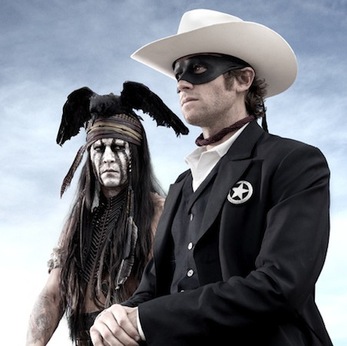Review:
"The Lone Ranger"

Release Date: July 3, 2014
Rating: PG-13 Running Time: 149 minutes What happened to the Johnny Depp who once surprised and enthralled us with the oddballs he so lovingly brought to life? The Depp who found such joy in playing the likes of Edward Scissorhands, Ed Wood, and Raoul Duke? Oh, that’s right, thePirates of the Caribbean franchise happened. Hey, I’m not going to knock Capt. Jack Sparrow. He’s a singular comic creation. He’s the pirate we all imagined Keith Richards would have been, which is why it was inevitable the Rolling Stone guitarist would play Sparrow’s father in several sequels. Unfortunately, Pirates of the Caribbean transformed the previously adventurous and underappreciated Depp into a superstar whose affinity for quirky social misfits no longer carries the risk factor it did pre-Pirates. We know the eccentricities Depp’s characters will possess even before he introduces them because he’s played carbon copies of them in almost every film since the first Pirates. Willy Wonka, the Mad Hatter, Barnabas Collins, Sweeny Todd, and, to a lesser extent, Paul Kemp in The Rum Diary. Imagine how less distracting Depp would have been in Charlie and the Chocolate Factory and Alice in Wonderland were he decidely less freakish. Depp seems bored playing it straight, as demonstrated by The Tourist. Which brings us to The Lone Ranger, which stars Depp as Tonto to Armie Hammer’s John Reid. The Lone Ranger reunites Depp with Gore Verbinski, the director of the original Pirates trilogy, franchise producer Jerry Bruckheimer. Disney foots the bill, as it does with the ongoingPirates franchise. So it’s not a surprise that The Lone Ranger plays out as Pirates of the Caribbean in the wild wild West, with Depp channeling Sparrow as Tonto. The jokey tone of this $215 million adaptation of the 1930s radio show and 1950s TV series—which involves Tonto teaming up with the Lone Ranger in 1869 Texas against Tom Wilkinson’s dastardly railroad man—is dictated by Depp’s yawn-inducing off-kilter performance. There are times when Depp’s Tonto is as far out as Sparrow and other times when he’s the wisest man in the room. It’s impossible to get a read on his Tonto, who harbors a hatred of white men for painful, understandable reasons but needs the help of a particular white man, the Lone Ranger, to confront the demons of his past. Depp alternates between treating his participation in The Lone Ranger as a lark and trying to make a profound statement about the genocide of Native Americans in the name of progress and westward expansion. In the end, Tonto’s an unlikable, dreary caricature who’s forever stuck in Sparrow’s shadow. Depp would have better served The Lone Ranger by playing John Reid, the lawyer turned Texas Ranger who cheats death to become a masked man of vigilante justice. Depp likely would have given Reid the gravity and pathos required to care about his crusade. Instead, we have Hammer as the Lone Ranger. The Social Network proved Hammer can act. He was magnetic as the Winklevoss twins. In The Lone Ranger, he’s as heroically bland as he is handsome. There’s nothing to Hammer’s Lone Ranger. You never feel the sense of outrage and desire for vengeance that boils inside Reid. Hammer also has no feel for slapstick, which obviously is a problem considering Verbinski too often treats Reid as nothing more than a circus clown. Verbinski clearly has no respect for the simple virtues that the Lone Ranger harbors, including honor, duty, and sacrifice. In the meantime, the supporting cast—from Wilkinson and the villainous William Fichtner to Helena Bonham Carter—are as wasted in The Lone Ranger as the money at Verbinski and Bruckheimer’s disposal. To be fair, Verbinski knows how to stage an imaginative action scene, and he often does so in awe-inspiring fashion. Unfortunately, when he’s not crashing trains or blowing up bridges, Verbinski doesn’t bring any energy to the proceedings. The Lone Ranger drags more often than it doesn’t, and it feels as labored and contrived in its execution and dark humor as Verbinski’s two Pirates sequels. The Lone Ranger certainly is never as much fun as Rango, the delightfully peculiar animated western Verbinski directed that featured Depp’s voice. Even the climax, which features our heroes divided and battling the bad guys on two trains bound for disaster, seems off because of the use of the “William Tell Overture,” which served as the theme music of both the radio show and the TV series. This music is rousing and uncomplicated, so it doesn’t fit the comical way that Verbinski constructs the showdown. The Lone Ranger begs to be taken seriously, with a dash of humor here and there to lighten things up. Instead, this is nothing more than an unwelcome spiritual companion to Will Smith’s Wild Wild West. What also doesn’t work is the framing device that pays homage to Dustin Hoffman’s 1970 western Little Big Man. It finds an elderly Tonto recounting his adventures with the Lone Ranger to a young boy. There’s no reason for it, and it only ends up turning Tonto into a figure of ridicule. As it known by now, The Lone Ranger was envisioned by Disney as a new franchise for Depp, Verbinski, and Bruckheimer. We won’t see any further installments as a result of The Lone Ranger’s stunning box office failure. If any good comes out of The Lone Ranger, it that’s it will serve as a wake-up call to Depp. It’s time for him to find a new way to challenge himself and enchant audiences. Oh, and maybe Warner Bros. might want to rethink about its decision to cast Hammer in its upcoming big-screen version of The Man from U.N.C.L.E. if The Lone Ranger is anything to go by, Hammer doesn’t have what it takes to save the day. Robert Sims Aired: July 4, 2013 Web site: http://movies.disney.com/the-lone-ranger |
|
